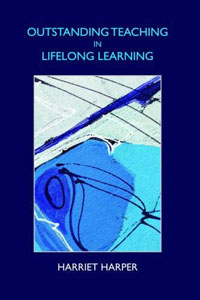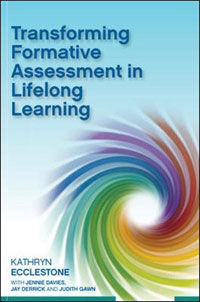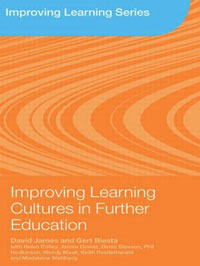
Dr David Powell
HudCRES, and Director of The Education and Training Consortium
Dear Ofsted,
Thank you for your invitation for me (and other colleagues in education) to send you feedback on your draft education inspection framework (EIF).
Like Frank Coffield in his recent IOE blog, Ofsted's worst practice ..., I welcome your decision to put the curriculum ‘at the heart of education’ (Ofsted Inspection framework: overview of research, p.4) and share your concerns for ‘staff well-being and workload’ (p.39). However, I would like to draw your attention to three aspects of the Framework which most concern me and make suggestions about how these might be addressed.
Your research evidence and the absence of significant further education and skills (FE&S) research
I can see you have spent a lot of time and money on this Framework and its research evidence. In particular, I am grateful that you have introduced me to some UK-based and international research. Yet 50 of the texts in the list of 315 references were published in the last century - almost 16% are 20 or more years old. What’s your justification for including so many dated references?
You state:
the research reviewed here is in large part drawn from that done in schools’ and early years’ settings, rather than in further education and skills (FE&S) providers. This is largely due to the relative paucity of research in FE&S compared with the other sectors … (Ofsted Inspection framework: overview of research, p.3).
This is a well-known trope, though you include none of the significant FE&S research done in your evidence and reference list.
There are just two citations to FE&S research in your evidence. In the first you assert: ‘In further education there is a particular emphasis on distributed leadership, with much of the instructional leadership residing at programme level in the large and dispersed providers in this phase (Muijs et al, 2004)’ (Ofsted Inspection framework: overview of research, p.34). The Muijs et al. research (Improving Schools in Socio-Economically Disadvantaged Areas: An Overview of Research) clearly relates to schools, not FE&S, so I would argue you cannot use it to make this claim. Second, on page 39, you report results of your own research into well-being in schools and colleges, though this is not listed in the references. Perhaps it would have been useful to include someone with specific knowledge of research in FE&S to be involved in the review of evidence and production of the overview of research report?
Here are some key, post-2000, FE&S texts I recommend you include in the research evidence and why I think they are important:
Harriet Harper's Outstanding teaching in Lifelong Learning (2013). This is based on her and her fellow Her Majesty’s Inspectors' analysis of 20 excellent lessons they observed in FE&S, and would inform the section on effective teaching.
The University and College Union Whole College Behaviour Management study, Parry and Taubman (2013). This is the largest study of student behavior and its management in FE&S and draws on analysis of 400 online surveys completed by UCU members, reviews of 30 college’s behaviour management policies, and interviews with managers, support staff, teachers, and students at eight colleges. The findings of this study would enrich your section on Behaviour and Attitudes - it discusses some of the unique factors shaping behaviour in FE&S and possible strategies to address them.
Kathryn Ecclestone and colleagues undertook a three year study in FE&S that generated 6 case studies about assessment that were published in Transforming formative assessment in Lifelong Learning (2010). These case studies would help to illuminate the practice of assessment for learning in FE&S and thus your assessment section and future inspections.
The research into subject-specialist pedagogy led by my colleague at HudCRES, Professor Kevin Orr, and funded by The Gatsby Foundation, is very current. Their recently published Literature Review of subject-specialist pedagogy merits inclusion in your effective teaching section and would enhance inspectors’, teacher educators’, practitioners’ and their managers’ understanding of this important topic.
Improving Learning Cultures in Further Education, James and Biesta (2007). This was described in the foreword as 'the fruit of the biggest research project ever carried out in the United Kingdom into Further Education (FE)' (p.xiii). It presents the case for ‘a cultural approach to the improvement of teaching and learning’, offering ‘practical guidance for researchers, policy-makers and practitioners for implementing change.’ This work would contribute to the section on leadership and management.
You could also approach the Further Education Trust for Leadership for relevant recent research on leadership and management and UCU for research on well-being and teacher workload in FE&S.
The challenges of assessing the FE&S curriculum
I agree with your assertion that a well-planed curriculum is important for students' learning and that teachers should be able to effectively plan an enriching curriculum. You state that FE&S inspectors will judge a provider’s curriculum 'favourable' if teachers have ‘planned the coverage, content, structure and sequencing of the curriculum, and can show that they have implemented it effectively’ and the ‘content is taught in a logical progression, systematically and explicitly for all learners’ (Ofsted Draft Further Education and Skills Inspection Handbook, 2019, p39)
However, this is more complex than it first appears. If inspectors are to 'assess' the quality of the FE&S curriculum, they will all need to be vocationally current, subject specialists in the subject they are inspecting because they will need to know in that subject the threshold concepts, what concepts students find difficult (Hattie, 2003), and the possible implications for the sequencing of topics. James Crawley’s doctoral thesis (p.420) claims ‘there are at least 200 subjects on offer at any given time in just one medium [FE&S] sized provider’. Do you have sufficient vocationally current, subject specialists for your inspection teams?
The complexity of teaching, learning and assessment (TLA) and the problem of grading
You factorise TLA into a checklist of ‘Outstanding, Good, Requires Improvement, and Inadequate’ characteristics in the FE&S handbook. Eraut (2000, p.133) stated that ‘tidy maps of knowledge and learning are usually deceptive’ - and I agree. Coffield (2014, p.113) would argue that you are presenting TLA as ‘uncomplicated’ so that you can control and measure it. Actually, TLA is ‘messy’, ‘unpredictable’, complex and ambiguous (ibid) and, in FE&S’s case, ‘strongly context-dependent’ (Hanley et al., 2018, p.17). As such, ‘what works, or is deemed good practice in one learning site may not work or be good practice in another’ (ibid). How is this complexity and messiness going to be dealt with by inspectors?
For me, and many others, the only way forward is for you to heed the sector’s voices and move away from grading colleges (and schools). Here is my suggestion for how you can do this.
The EIF suggests that TLA as practices are de-contextualised from the site where they happen. This is not so. I urge you to include an additional section in the EIF on Ball’s four site-specific forces that actively shape TLA: the site; the different learning cultures of the site; resources; and the FE&S policy context (Coffield, 2014, p.83). Now you have a framework in which to qualitatively capture the practices of TLA and what shapes them. This would help inform government policy, too.
And finally ...
You could be brave, democratic, and radical by inviting providers to write a ‘second text’ (Segall, 2002) on your inspection report. This is a research approach that seeks to ‘create a polemic, text that invigorates discussion about…education rather than stifles through the (misleading) appearance of consensus… the Secondary Text attempts to reflect the impossibility of mapping an “untidy” world into a “tidy” text (Lather, 1996, p.529) and the problematics inherent in the interpretation of (someone else’s) lived experience.’ (Segall, 2002, p.150-152). Providers' italicised commentary could be included alongside the original text.
I hope this feedback is clear and helpful. May I wish your revised text every success.
Best wishes, David




